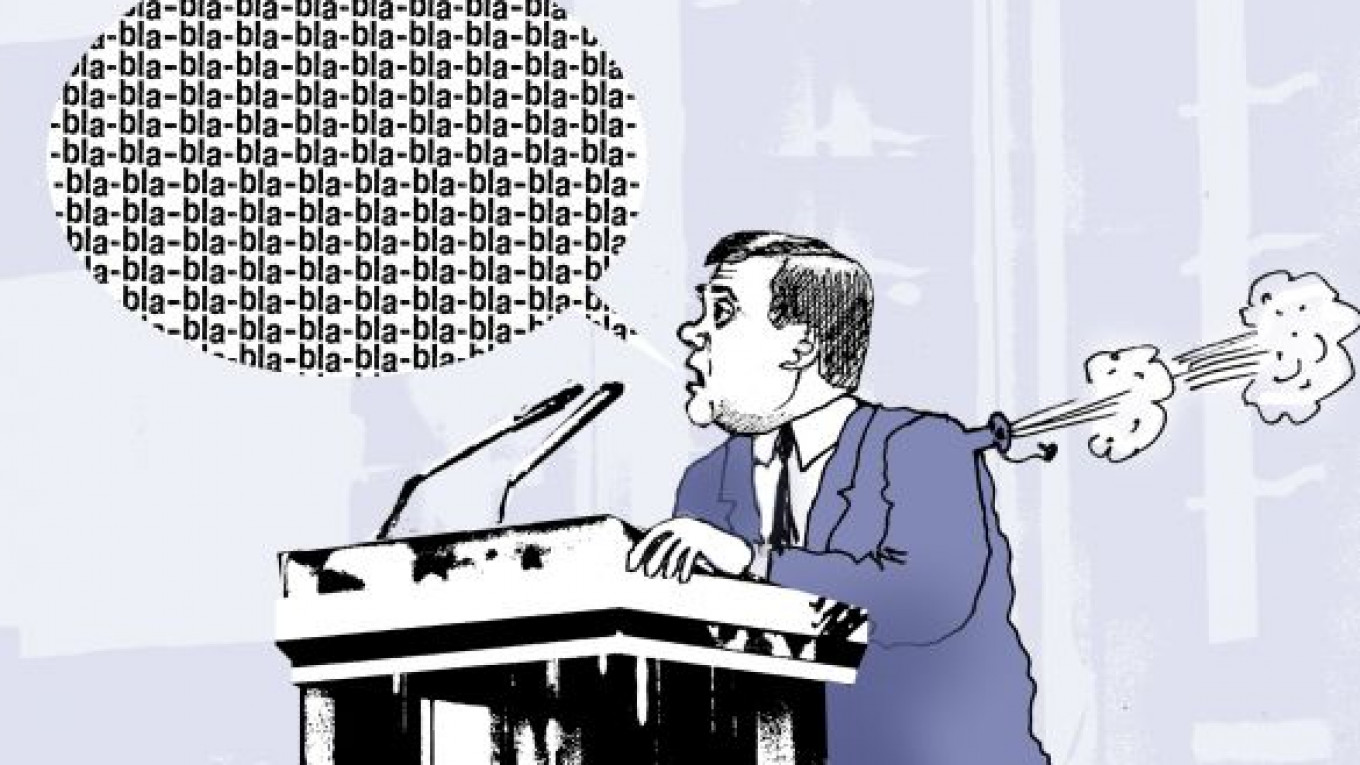Judging by the buzz in Moscow, President Dmitry Medvedev’s news conference, which was held on May 18 to an audience of more than 800 journalists, was expected to be the event of the year. The number of journalists and unprecedented format — Medvedev had not done anything like it during his presidency — all suggested that there would be an important announcement. Speculation began long before the event and ranged from the belief that Medvedev would finally announce his candidacy for president in 2012 to the rumor that he would fire Prime Minister Vladimir Putin.
But in the end, the highlight of the news conference was a joke that began to circulate on the Internet while he was still speaking: “It’s clear that now there are two new political camps in Russia — Putin’s party and Medvedev’s party. Unfortunately, it’s not yet clear which party Medvedev belongs to.”
Medvedev moderated the news conference and carried himself very naturally — like a professional talk show host. He spoke for more than two hours and touched on the broadest possible range of topics, from the lack of parking places in Moscow to the fate of Arctic reindeer. He demonstrated not only the ease of a showman but the skill of a diplomat, because only a diplomat can speak for so long without saying anything. With that kind of skill, is it a wonder that the president spent more time on the problems of gardeners than on the issue of the upcoming presidential election?
Journalist Konstantin Gaaze asked on his Facebook page: “Why didn’t I hear even a hint of a statement about what kind of economic policy he’s planning for the future? Not a word about inflation, not a word about the price hikes in utilities rates. Not a word about anything that is truly important and a real problem.”
That’s not to say that no important questions were asked. But the answers were given in the usual ambiguous style of Russian politicians, a manner of speaking that allows everyone to interpret statements as they choose. The president was twice asked about Mikhail Khodorkovsky. The president ignored it the first time, but the second time, when a journalist asked whether the jailed businessman would pose a danger if he were released, Medvedev replied laconically: “He is absolutely not dangerous.” Does that mean the president is prepared to pardon him? Or does it mean that even if Khodorkovsky were released, he wouldn’t be a danger simply because he wouldn’t be permitted to take part in public life?
Medvedev’s foreign policy bloc of questions also made quite an impression. His pronouncements were interpreted by anti-West commentators as “a return to the traditional position of Russian diplomacy.” When he discussed the UN Security Council resolution on Libya, Medvedev warned that “it’s wrong to continue on this way” and that “states must be given the opportunity to choose their own path of development themselves.” Read: After shooting their citizens, dictators can sleep peacefully. And as for the United States, Medvedev threatened that Russia would increase its budget for nuclear weapons if it can’t come to an agreement with NATO on missile defense.
Journalist Leonid Radzikhovsky thought that Medvedev’s performance was nothing more than “a job request with assurances that he had no ambitions for power.” He explained on his blog: “Medvedev wants to keep the title of president. But that depends on Putin. Medvedev is showing Putin that he could never find a less dangerous and more malleable seat-warmer than him.”
Ksenia Larina came to the opposite conclusion on her LiveJournal blog: “This was the speech of a lame duck, a man who decides nothing and has no willful aspirations. You don’t start an election campaign with a performance like that — you end a career with it.” Lilia Shevtsova, a researcher with the Carnegie Moscow Center, seemed to agree, writing on her blog, “Medvedev committed political hara-kiri in front of the entire country.” She warned that “endless blather about modernization without the will or commitment to do something undermines any notion of change. Soon that tune is going to make people gag.”
But other predictions were more radical. The blogger Oleg-ttt wrote with good justification: “Nothing makes an uprising more likely than the population’s loss of hope for any alternatives. Today, Medvedev did more than he planned to do — he killed the alternative to a mass revolt.”
That probably goes too far, but it’s hard not to agree with the diagnosis made by the editor of Ukrainian Forbes, Vladimir Fedorin: “The Medvedev presidency has come to an end. His reputational capital … is completely exhausted. … The President Medvedev Project is over.”
Victor Davidoff is a Moscow-based writer and journalist.
A Message from The Moscow Times:
Dear readers,
We are facing unprecedented challenges. Russia's Prosecutor General's Office has designated The Moscow Times as an "undesirable" organization, criminalizing our work and putting our staff at risk of prosecution. This follows our earlier unjust labeling as a "foreign agent."
These actions are direct attempts to silence independent journalism in Russia. The authorities claim our work "discredits the decisions of the Russian leadership." We see things differently: we strive to provide accurate, unbiased reporting on Russia.
We, the journalists of The Moscow Times, refuse to be silenced. But to continue our work, we need your help.
Your support, no matter how small, makes a world of difference. If you can, please support us monthly starting from just $2. It's quick to set up, and every contribution makes a significant impact.
By supporting The Moscow Times, you're defending open, independent journalism in the face of repression. Thank you for standing with us.
Remind me later.








